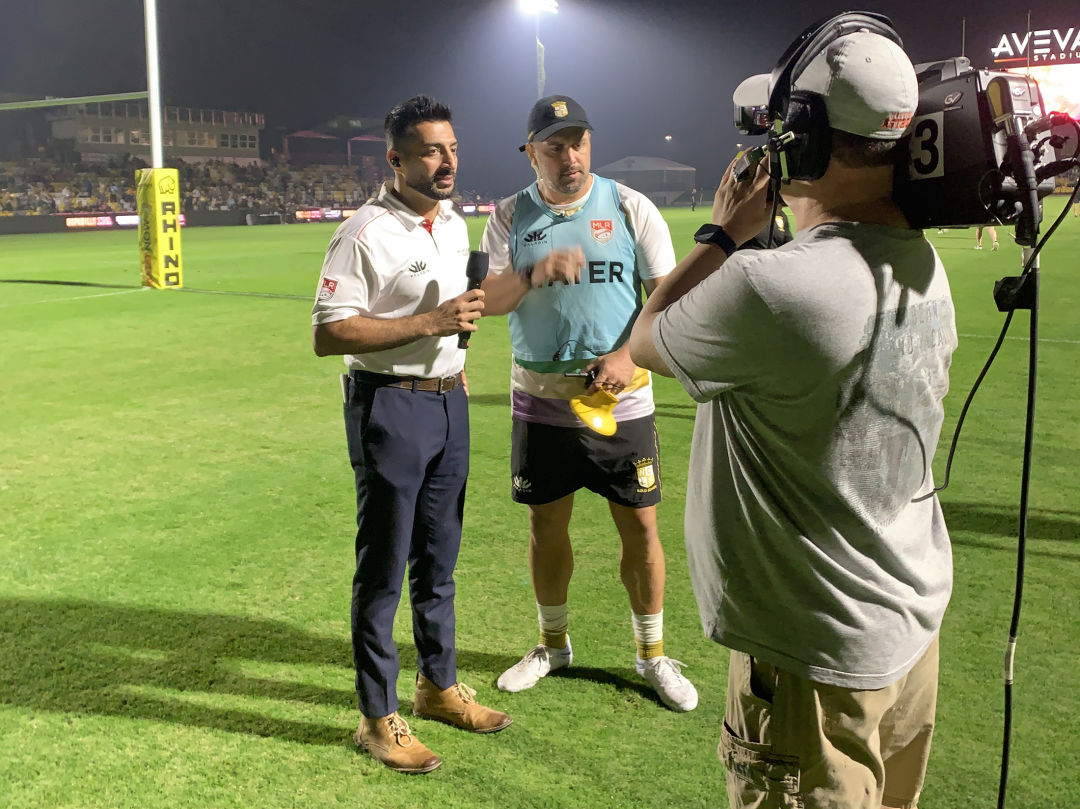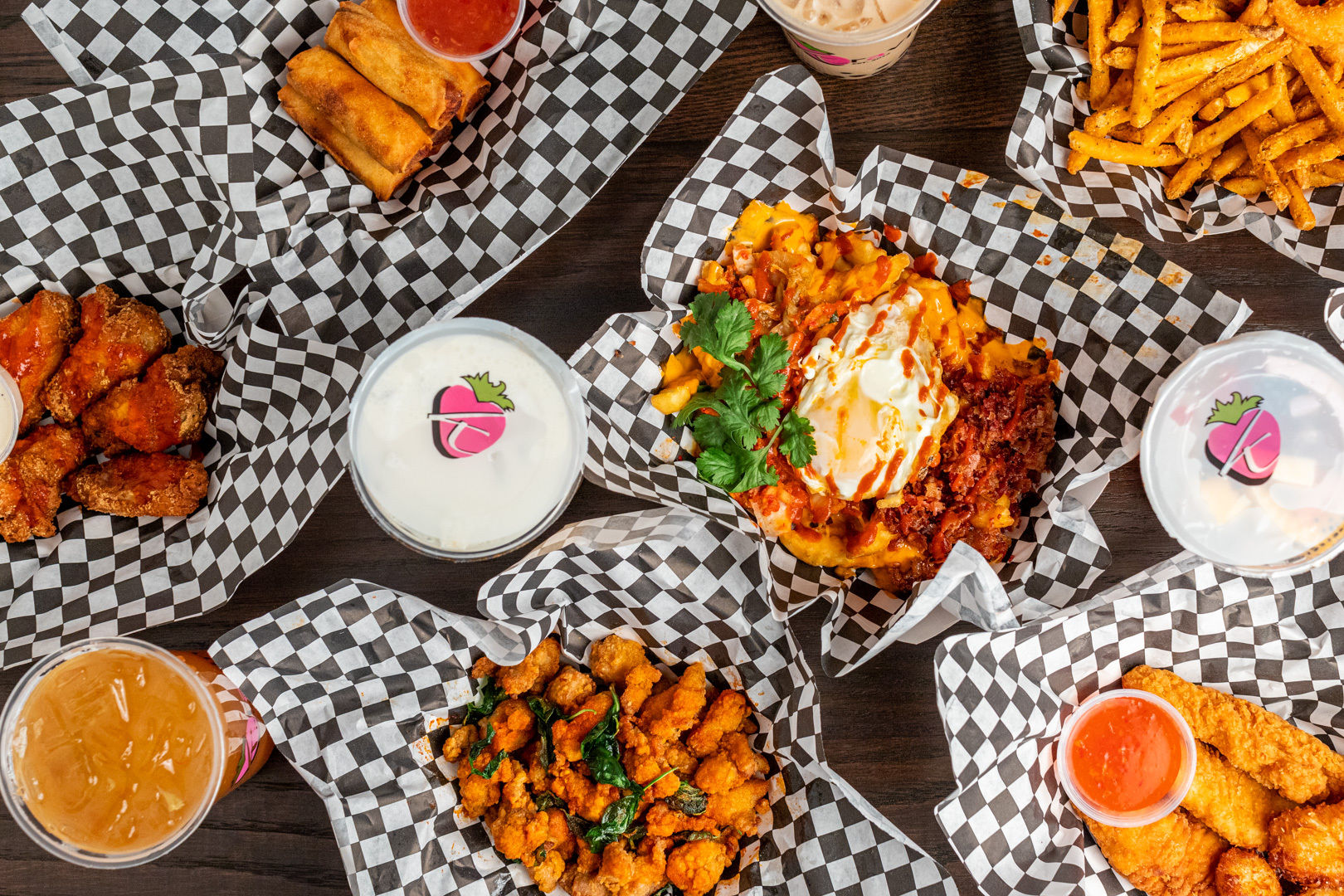How This Houston Voice Became America’s First Ismaili Sportscaster

Image: Courtesy Raheel Ramzanali
Toward the end of high school, Raheel Ramzanali faced the facts: Though he was an avid basketball fan, he wasn’t good enough as a player to go pro. He gave up on his NBA dreams and set his sights on being a dentist. But during an interview for a scholarship, he remembers the evaluator pulling him aside, drilling him for an honest answer about what he wanted to be when he grew up.
“I want to talk sports,” Ramzanali remembers saying. “I see people on the news do it. I [listen to] sports radio. Can I do that?”
Now, Ramzanali does just that. You may not recognize his face, but you’ve definitely heard his voice. From local sports radio to the City Cast Houston podcast and UFC commentating, the Pakistani-born Alief resident has become one of the most prominent multihyphenates in the city and the first Ismaili Muslim sports radio broadcaster in the country. Despite these accomplishments, Ramzanali is just like every other Houstonian: a basketball fanatic who detests the city’s traffic. From his roots in Pakistan and Alief, Ramzanali has grown into one of Houston’s defining voices.
Ramzanali’s story reflects the quintessential experience of an immigrant child in Houston: There’s a lifelong hustle for more, some dream-achieving along the way, and a giant admiration for the Rockets and professional wrestling. Ramzanali and his family first moved to Houston in 1990, relocating their entire life from Karachi, Pakistan’s largest city. On the drive from the airport to a relative’s home, Ramzanali remembers coasting down an overpass, thinking he was flying again.
“As a 5-year-old in America for the first time, I was floored by it,” Ramzanali says. “You didn’t have those big flyovers in Karachi.”
They moved into the Tradewinds Apartments in Alief. “It was an apartment complex that a lot of Ismaili Muslims live in, so it was almost like back in Karachi,” he says. Back then, Houston’s community of Ismaili Muslims, a Shia branch, was small. Today, it’s an estimated 40,000, the largest in the country, Ramzanali says. “It was hard explaining it to people,” Ramzanali says. Classmates struggled to understand his heritage, he says, wondering how an immigrant could be from anywhere other than Mexico.
Ramzanali, however, was just like any other American kid, he says. He went to school, had friends, and fell in love with American sports. He learned to play basketball at the apartment complex from a security guard whom he and kids in his neighborhood nicknamed “Jordan.” (His real name was Brian.) Ramzanali continued to play basketball—at the apartments, during pickup games at the local YMCA, and at school—all the while dreaming of becoming a professional basketball player like his idol, Houston Rockets center and Hall of Famer Hakeem Olajuwon.
“I moved here. I see a guy named Hakeem, a Muslim, fasting during playoff games, during Ramadan, and he’s winning championships,” Ramzanali says. Sold.

Image: Courtesy Raheel Ramzanali
Ramzanali dove deeper into his sports fandom, spending his free time listening to sports radio and practicing his moves. He quickly picked up a love for other American sports too, including football. Pro wrestling dominated the TV in his home, and it wasn’t odd to see him practicing some of the moves he witnessed on his brother. The two even saved up enough working at their father’s perfume business to buy nosebleed seats at a WrestleMania X-Seven taping in Houston in April 2001— Ramzanali’s first live sporting event. “We were literally touching the top of the Astrodome,” he jokes.
Months after that WrestleMania show, Ramzanali’s life in America shifted in a matter of hours, as hijackers flew planes into New York City’s World Trade Center on 9/11. Ramzanali, then just a 16-year-old kid, became a target. Classmates began harassing him because of his Pakistani background and Muslim faith, hurling insults and accusing him of being a “terrorist.” “I think kids [forgot] that just because I look like somebody that might have committed those atrocities doesn’t mean I’m one of them,” he says. “This happened, but that’s not a representation of all Muslims.”
When bullies spewed rampant Islamophobia, Ramzanali remembers trying to deescalate fights and educate others about his culture. “Representation matters and, especially in that time, representing my community, my country—it was important to me, and still is,” he says.

Image: Courtesy Raheel Ramzanali
While battling bullies, Ramzanali prepared to enter college, hoping to become a dentist like his older brother. But after that fateful scholarship interview, he changed his mind, instead pursuing broadcast journalism, a decision his parents didn’t understand. As with many immigrant families, markers of success for his parents meant becoming a doctor, lawyer, engineer, or entrepreneur, he says. To them, “sports radio host” was a foreign concept and a surefire way to unemployment, he says. But Ramzanali persisted.
He attended his freshman year at the University of Texas at San Antonio but later attempted to transfer to the University of Texas at Austin to attend its radio, television, and film program. Despite a 4.0 GPA, he got rejected. Turns out, it was the wrong program. He later learned, thanks to a helpful UT dean, that the communications program and broadcast journalism major were a better fit. “I was figuring all this out,” says Ramzanali.
Soon after enrolling in the communications program, Ramzanali started securing internships at various TV and radio stations around Houston, including the legacy station Sports Radio 610. “I interned every single break. Winter, summer, spring, I was there,” Ramzanali says. He earned his big break following graduation in 2007: After impressing radio veterans like John Granato, Lance Zierlein, and Ken Hoffman at his internship with his work ethic, he earned a full-time reporting position on 1560 The Game, then a local start-up radio station in Houston.
Finally, “my parents were like, ‘OK, we can exhale just a little,’” he says with a laugh. “That’s when the real work started.” Fresh-faced and excited, Ramzanali dove straight into the sports world, working 60-hour weeks to cover Rockets, Astros, and Texans games. An interview with NBA icon Kobe Bryant after a Rockets game “was a pinch-me moment,” he says.
During his first year on 1560 The Game, Ramzanali would catch another big break, at 22: Hoffman, previously a columnist for the Houston Chronicle, invited Ramzanali to his two-hour experimental, anything-goes show on the station. The episode was a hit. “One day turned into a week. A week turned into a month, and I was cohosting in Houston because of Ken Hoffman, within my first year out of college,” Ramzanali says. “Needless to say, people were not happy.”
Sports radio remained overwhelmingly white at the time, with few voices of color—let alone Muslim voices—on air. Audiences were still reeling from the impacts of 9/11, and Islamophobia was rampant. So, when Ramzanali joined Hoffman's show as a cohost, he was a pioneer. “I was the first one,” Ramzanali says. “I was the first Ismaili to do this in the USA, in sports [radio].”

Image: Courtesy Raheel Ramzanali
Some fans of the show were not pleased. At one point, the station even suggested he change his name to the Italian-esque alias “Roy Ronzoni” to appeal to listeners. Ramzanali refused. “I’m proud of who I am,” he says.
After four years at the station, feeling burnt out, Ramzanali quit the Game. He stayed in Houston, working various jobs in social media management, but later returned to sports journalism, working at outlets like ESPN Houston. On the side, he launched a modeling career, appearing in ads for Lululemon and Movember, a men’s health charity. These days, he’s the host of popular local podcast City Cast Houston, doing interviews about local politics, the food scene, and more. And he still indulges in his love of wrestling and contact sports as a regular commentator on Fury Fighting, a mixed martial arts show and podcast on UFC Fight Pass.
Ramzanali realizes now that while pursuing what he loves—American sports—he’s become a mentor within the Pakistani and Ismaili community. Aside from showcasing different aspects of Houston through his podcasting, Ramzanali says he strives to guide and help other Pakistanis who want to pursue similar careers, even talking with curious parents about his career path.
“I want the next generation to know that this is just a normal career path,” he says. “It’s possible for a ‘Raheel Ramzanali’ to make it.”




